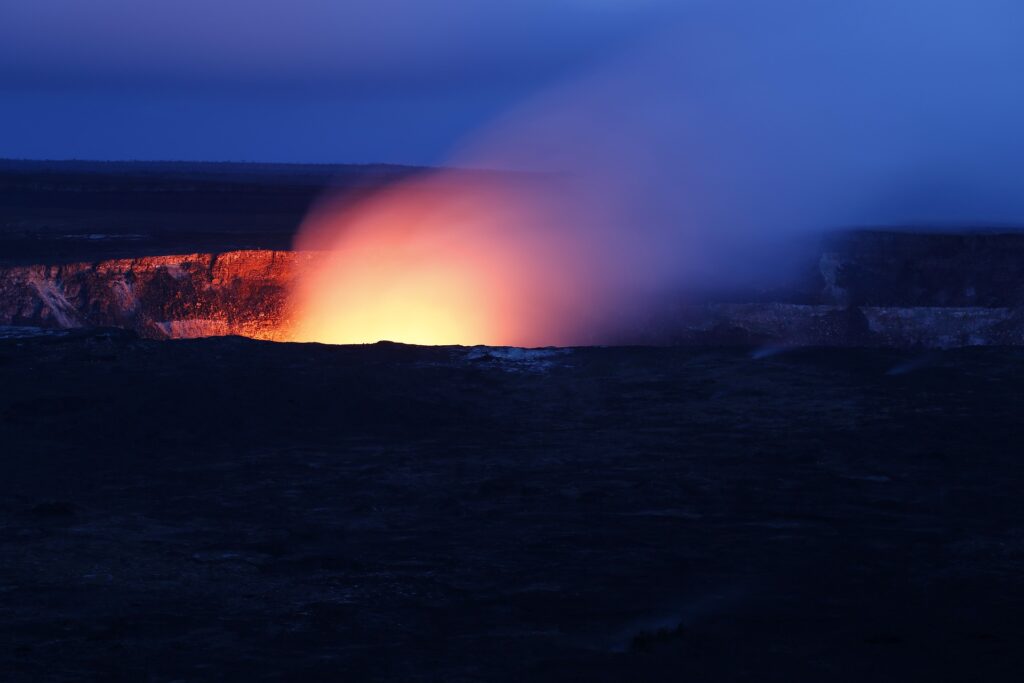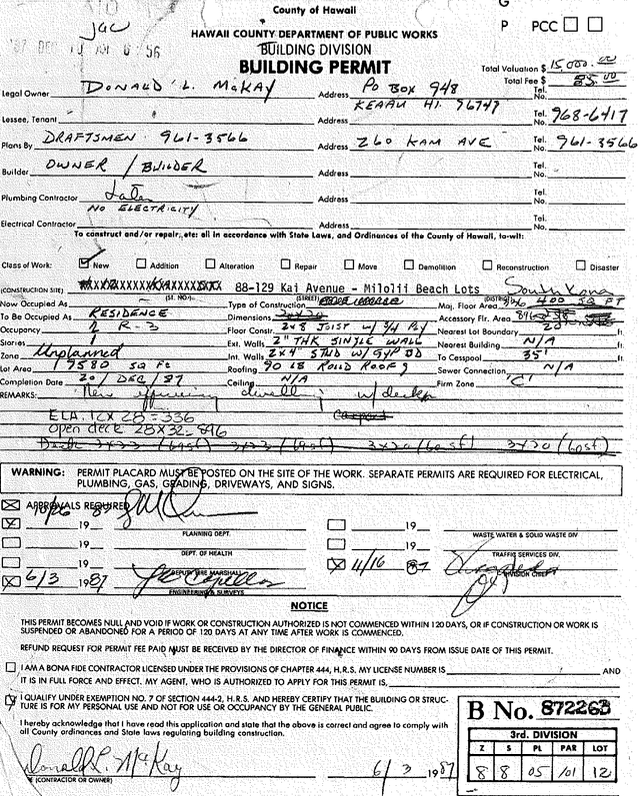Building permits are crucial documents that regulate construction activities and ensure compliance with safety standards. However, the idea of canceling a building permit issued over 35 years ago raises significant ethical, legal, and practical concerns. The Circuit Court of the Third Circuit in the State of Hawai’i is slated to hear case 3CCV-23-0000231 – 88-129 Kai v. Board of Appeals, et al. where the County’s Department of Public Works has canceled a building permit originally issued in 1987 some 35 years after the permit was issued stating that the permit had expired on June 1st of 2022. The property which is located at 88-129 Kai Ave Captain Cook HI 96704 was built in the late 1980s and had been occupied by its owner-builder until fairly recently when it was sold. In 2020, the Department of Public Works “DPW” issued a remodeling permit to the new owner to upgrade the dwelling with more modern amenities and also to have a new septic and catchment tank installed and in 2022 the same department issued an electrical permit for the Hawaii Electric Light Company, Inc to re-connect a service that was previously disconnected. After most of the work had been completed, the county refused to inspect but instead canceled all the permits stating that because the building permit expired in 2022, they had issued all the newer permits in error.
The Director of the Department of Public Works Stephen Pause stated during a Board of Appeals hearing that because he was the only authority with the ability to render interpretations of building laws and County codes therefore he did not make an error in canceling all the permits and that the new owner should pull brand new permits to the current codes. A major obstacle given that zoning and building codes are vastly different now than they used to be back in the 1980s and that new regulations or requirements can overburden the permit applicant. The new owner took the case to the Board of Appeals where they were denied any remedy even though the Board members felt that the County had erred in canceling the permits. The Board members are appointed by the Mayor of Hawai’i County and even though they claim to be neutral parties, they are often the pawns of county business. This article explores why a county should be prohibited from canceling a building permit issued decades ago and emphasizes the importance of preserving property rights.
By letter dated October 6, 2022, DPW revoked Appellant’s building permit no. BK2020-00049. According to DPW, “there [were] two permits involved: the original Permit No. 872263 for the efficiency dwelling and a second Permit No. BK2020-00049 for alterations.” The Department of Public Works argued that “Permit No. BK2020-00049 for the alterations was issued in error since the referenced Permit No. 872263 was not granted a permit extension by the June 1, 2022, deadline.”
In light of the County’s present situation with expired licenses and the implementation of EPIC, the Department of Public Works has implemented the following policy, which will take effect on September 7, 2021, according to a post dated September 2, 2021. As per the Hawaii County Code, valid permits that haven’t expired yet can be transferred, renewed, or requested to be extended before the expiration date. In order to allow for project completion, permits that have already expired as of September 7, 2021, will automatically be granted a 180-day extension until March 7, 2022.” DPW said in a notice dated February 23, 2022, that “permits issued on or before March 27, 2012 [they] will expire as of June 1, 2022.” (ROA: page 26). Additionally, DPW stated in that same notification that “Permits issued on or before March 7, 2017 [they] will expire as of September 7, 2022.”
In order to support its claim that Permit No. 872263 expired without completion or final inspection, DPW is unable to produce any supporting documentation. According to DPW’s own records, Permit No. 872263 was in the state of “CHK W. BLDG” and had an expiration date of “not available.”
In the meantime, DPW claimed to be extending “permit application cancellation amnesty” to the public by publishing many notices. In which DPW asserts that “Amnesty will be granted for permit application cancellations (per HCC Section 5-4-7) until the reliability of all email communications through the EPIC system is confirmed.” On November 30, 2021, it was found that although permit applications did proceed through the EPIC system as intended, there was a technical problem with the system that prevented applicants from receiving email notifications regarding the progress of their applications.”
It is undeniable that the appellant relied on the presence and validity of building permit BK2020-00049 in this instance, particularly given the facts of the case. Prior to, throughout, and during the implementation of the renovation plans that he purchased in 2021, the appellant had multiple direct communications with DPW. The DPW did not formally notify the appellant that BK2020-00049 was revoked on the grounds that permit 872263 had expired because there had been no final inspection until October 6, 2022. Building permit 872263, on the other hand, was still valid according to information found in DPW internal communications, with the status being “CHK W/ BLDG.”
Therefore, DPW ought to be fairly prevented from canceling permit number BK2020-00049.
Property owners rely on the stability and certainty of legal frameworks when undertaking construction projects. Canceling a building permit issued over 35 years ago disrupts this stability, introducing uncertainty and potentially jeopardizing property rights. In many jurisdictions, legal doctrines such as laches and estoppel may prevent authorities from challenging permits after an extended period due to the importance of legal finality.
Equity is a fundamental principle in law, emphasizing fairness and justice. When a building permit is issued, property owners make investments, decisions, and plans based on the assumption that the permit is valid. Although this is not a case involving a discretionary permit, the official guarantees analysis nevertheless holds true—if not more so—in cases where the government conduct is of a ministerial nature. Canceling such a permit decades later may result in unjust consequences for property owners who acted in good faith, potentially leading to financial losses and legal battles.
Over 35 years, local building codes, regulations, and zoning laws may have undergone significant changes. It is unfair to penalize property owners for changes in the regulatory landscape that occurred after they obtained a valid building permit. Grandfather clauses and legal doctrines protecting property rights recognize the need to balance evolving regulations with the rights of existing property owners.
Cancelling a building permit after several decades can have severe financial repercussions for property owners. Because he relied on the validity and existence of building permit BK2020-00049 when he bought the property in 2021 and sought advice from DPW in 2022, the appellant has suffered significant financial loss in this case. The permit was not revoked by DPW until October 6, 2022. Therefore, given the circumstances, the appellant’s reliance on the legality of the building permit and the statements made by DPW was reasonable. They may have invested substantial resources in construction, maintenance, and improvement based on the initial permit. Such cancellations not only undermine property values but also discourage investments in long-term property development.
Prohibiting the cancellation of building permits issued over 35 years ago promotes responsible and sustainable development. Property owners who have adhered to regulations and obtained permits should be rewarded for their compliance rather than penalized. Even though DPW later claimed that permit BK2020-00049 was issued incorrectly, the appellant here fairly relied on it. Notably, Section 5-5-1(d)(2) permits DPW to “revoke or suspend any permit when issued in error, on the basis of incorrect information supplied, or in violation of the construction code,” but it does not specify the precise legal basis for doing so. Encouraging responsible development aligns with broader goals of community development and prosperity.
Preserving property rights and legal certainty is paramount in any jurisdiction that values justice and fairness. Canceling building permits issued over 35 years ago disregards the principle of legal finality and undermines the confidence property owners have in the regulatory system. By promoting stability, equity, and responsible development, authorities can create a conducive environment for sustained growth while respecting the rights of property owners who have relied on valid permits for decades.
Patrick Wong of Carlsmith Ball LLP is the attorney of record for 88-129 Kai LLC.
Tavares, Sherilyn K, Idemoto, Steven Keiji and Salas-Ferguson, Sinclair are the attorneys of record for the Board of Appeals and the Department of Public Works.
Wendy DeWeese is the Judge of record at the Third Circuit, 4th Division.





